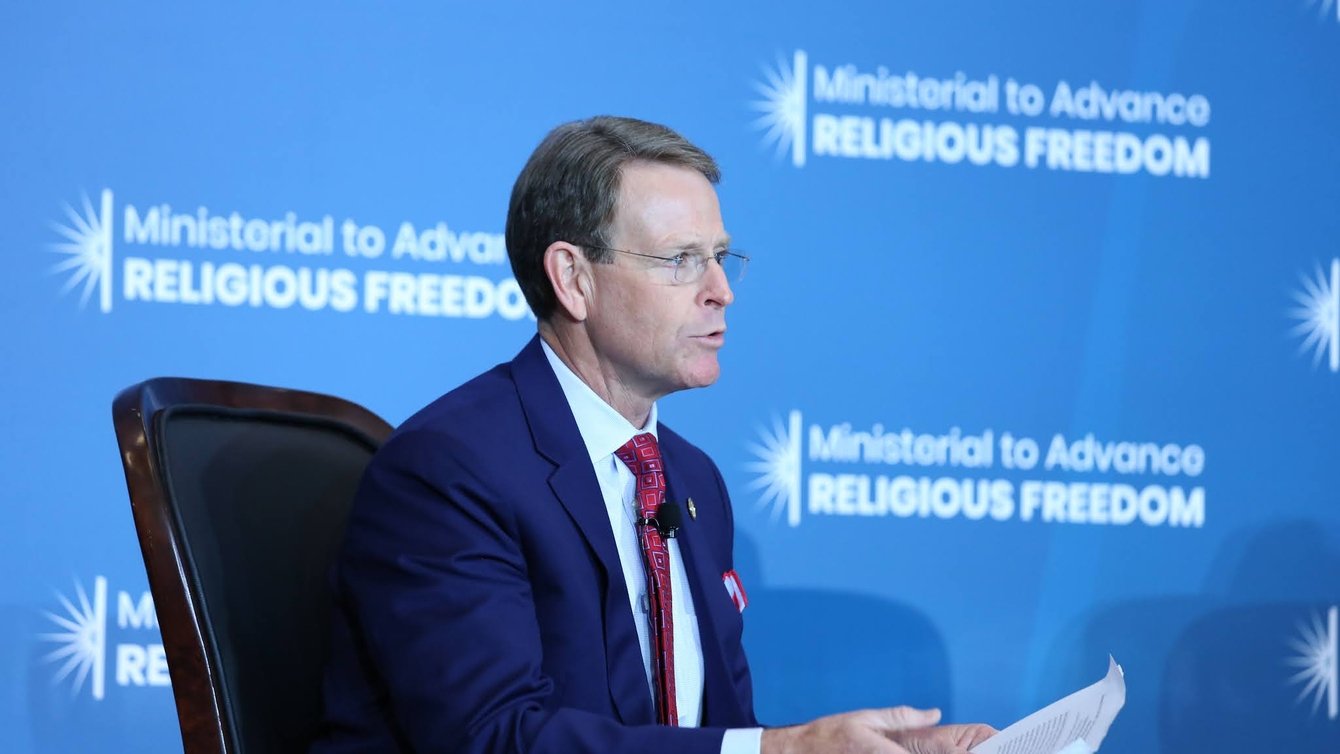The Family Research Council (FRC), a leading organization of the A movement that emerged in the 1970s encompassing a wide swath of conservative Catholicism and Protestant evangelicalism. Learn more has long featured Christian nationalist ideology in its materials and events — including speakers at its annual political conference, the Values Voter Summit. But those days may be over.
FRC’s new 2020 election resource, authored by David Closser, Biblical Principles for Political Engagement: Worldview, Issues, and Voting drops the claim that America was founded as a Christian Nation, and relies solely on an open ended Dominionist argument — which it also casts as non-partisan. But one could be forgiven, if after a close reading, one were to think that in the FRC worldview, biblical means Republican.
The guide takes 31 pages (plus notes) to conclude that Christians are “biblically obliged” to vote; that they should vote primarily according a candidate’s views on “abortion and human sexuality,” and that there is no room for disagreement.
“The Republican party,” Closser declares, “has generally embraced policy positions on abortion and human sexuality that are consistent with Scripture, while the Democratic Party has embraced positions on these issues that are at odds with Scripture.”
He says, however, that there may be “room for disagreement,” on matters of race and poverty.
“For our purposes,” Closson continued, “it will suffice to note that the need to care for the poor and marginalized is evident in the Bible. However, the Bible does not outline a specific remedy.” But he insists that it’s unfair to think that Republicans are “against the poor” just because “conservatives believe in the efficacy of limited government and free markets in addressing poverty.”
He declares that “church leaders” should do more than address moral questions in sermons and pray “for those in positions of authority.” He demands that they “carry ideas to their logical conclusion” and “describe practical action steps… and the reality of our two-party system.”
Closson goes on to compare evangelicals who prefer to be apolitical, to those who were complicit in the horrors of Nazi Germany and South African apartheid. He uses these loaded analogies to try to manipulate fellow Christians into political participation under the direction of FRC.
“[I]t is not enough,” he declares, “to acknowledge that various policy positions are profoundly evil and yet not encourage action.”
It is striking that an organization that was once so unambiguously Christian Nationalist makes no appeal to Christian nationalism in their 2020 election year resource.
In any case, old habits of mind die hard. Closson managed to shoehorn-in the strawman argument on which so much of the Christian Nationalist argument depends. Buried in the third endnote he claims that “progressive A neutral term used to describe someone or something, such as in law, as non-religious in character. Learn more elites” are telling conservative Christians that they are violating the idea of separation of church and state “by bringing their beliefs into the public square.” The Founders, he claims, “did not intend to erect a “wall of separation” between all expressions of faith in God and all aspects of public life.”
As is de rigeur in the knocking down of this strawman, Closson offers no examples of anyone who says that Christians should be banned from the public square. In any case, Jefferson did not intend his metaphorical wall of separation to limit public expressions of faith and no responsible person makes any such claim. The wall of separation is intended to protect the rights of all citizens by at once preventing government coopting of religious institutions, and by thwarting religious factions as a matter of constitutional proscription, from enshrining their religious views in laws and public policy. These are of course, the very aims of Donald Trump and his Christian Right allies. And that is why it is significant that the most important political formation of the Christian Right has demonstrated that it is terrified of non-theocratic Christians and opponents of Christian Nationalism, who believe in religious freedom, pluralism, and separation of church and state.
I wrote an article in The Public Eye in January 2018, titled A Manual to Restore a Christian Nation that Never Was, about the FRC’s grassroots political organizing manual I had picked up at the 2017 Values Voter Summit. The manual sought to justify conservative Christian political action and government by fusing the Christian nationalist ideal with the Dominionist notion of Biblical Principles informed by a Biblical Worldview. A significantly revised edition, published later in 2018, an election year, elided almost all of the Christian nationalist material, relying instead on the Dominionist argument. (Among other things, it encouraged pastors to urge their “congregation to vote their Biblical values.”) But it is striking that an organization that was once so unambiguously Christian Nationalist makes no appeal to Christian nationalism in their 2020 election year resource, issued by FRC and 21 state affiliates.
All this suggests that what the Christian Right has long treated as a strength was actually, or has become, a weakness.
Christian Nationalism Inside Out
The Christian nationalist idea has long been challenged by activists, scholars and journalists, and has been followed by a surge of critical writing and political action in the past year alone. A number of books, have, for example, gained wide attention. These include The Power Worshippers: Inside the Dangerous Rise of Religious Nationalism, by Katherine Stewart; The Founding Myth: Why Christian Nationalism Is Un-American by Andrew Seidel; Taking Back America for God: Christian Nationalism in the United States by Andrew Whitehead and Samuel Perry; and Revolution of Values: Reclaiming Public Faith for the Common Good, by Jonathan Wilson-Hartgrove.
There has also been considerable media coverage of the Christian nationalism of the secretive state legislative campaign, Project Blitz, including a statewide controversy in Minnesota that gained national attention. Simultaneously, a wide range of religious, secular and civil rights organizations have actively opposed Project Blitz’s overt and covert activities.
Christians who are opposed to Christian Nationalism are notably visible. William Barber and Jonathan Wilson-Hartgrove of the Poor People’s Campaign have called out Christian Nationalism and denounced it as “heresy.” Barber and Wilson-Hartgrove, joined by Katherine Stewart, all say that the contemporary Christian nationalism and antiabortionism, are a continuation of the politics of Both a system of beliefs that holds that White people are intrinsically superior and a system of institutional arrangements that favors White people as a group. Learn more since the successes of the Civil Rights movement that made overt racial politics much less palatable.
The BJC (Baptist Joint Committee on Religious Liberty) launched a campaign in 2019, called Christians Against Christian Nationalism. They called it “a persistent threat to both our religious communities and our democracy.” They warned, “Christian nationalism seeks to merge Christian and American identities, distorting both the Christian faith and America’s constitutional democracy;” and that “It often overlaps with and provides cover for white supremacy and racial subjugation.”
And the BJC and others have continued the Campaign.
Amanda Tyler, executive director of BJC, wrote, in response to Donald Trump’s now infamous June 1st stunt – in which he wielded an upside down bible for a photo-op in front of St. John’s Episcopal Church across Lafayette Park from the White House after clearing away protestors with mounted police and tear gas: “For many, the display had nothing to do with Christianity,” she said, “but instead was an egregious example of Christian nationalism with its attempted merging of religious authority and political authority…. that merging of authority is ‘idolatrous and often leads to The use of violence, intimidation, surveillance, and discrimination, particularly by the state and/or its civilian allies, to control populations or particular sections of a population. Learn more of minority and other marginalized groups as well as the spiritual impoverishment of religion.’”
Barber, Tyler, and the thousands of endorsers of the Campaign show that there is a religious and not just an historical, secular, or political argument to be made about Christian nationalism. Their high profile entry into this struggle may someday be seen as a turning point in the battle for the narrative of American history, and perhaps the story of Christianity as well.
Retreat or Retrench?
Several Christian Right leaders, led by Tony Perkins of the Family Research Council were alarmed by the Baptists’ campaign in the summer of 2019. They went so far as to deny that there was any such thing as Christian Nationalism. Perkins was joined in this by David Closser, FRC’s Director of Christian Ethics and Biblical Worldview, Mark Tooley of the Institute on Religion and Democracy, and even Christian nationalist author David Barton himself.
This seemed like an odd overreaction at the time, but now that Tony Perkins and the Family Research Council are close political and governing partners with Donald Trump’s Republican Party, their roles have changed, sometimes awkwardly. Senate Majority Leader Mitch McConnell appointed Perkins to the U.S. Commission on International Religious Freedom in May 2018 – a few months after the publication of my essay “A Christian Manual that Never Was,” related reporting by Paul Rosenberg in Salon, and a frantic response from Perkins in his national Washington Watch newsletter. Since then, the FRC has largely eliminated expressions of Christian nationalism from its public profile. Perkins now chairs the Commission.
Here’s the rub.
Religious nationalism of any variety, and all of the attendant bigotries that go with it –– runs against the grain of the mission of the USCIRF –– which by statute seeks to advance the values of religious freedom as a human right recognized in international law and treaties, notably Article 18 of the Universal Declaration of Human Rights. The Declaration affirms that:
“Everyone has the right to freedom of thought, conscience and religion; this right includes freedom to change his religion or belief, and freedom, either alone or in community with others and in public or private, to manifest his religion or belief in teaching, practice, worship and observance.”
The USCIRF asserts that “The freedom of religion or belief is an expansive right that includes the freedoms of thought and conscience, and is intertwined with the freedoms of expression, association, and assembly.”
In religious nationalist ideologies, the favored group seeks governmental power to enforce its views and, as the Christian Right has shown, treating anyone other than the favored faction as second-class citizens at best. And this is the paradox of Perkins’ role: Downplaying the overt Christian nationalist rhetoric that helped propel his movement to political power, while continuing to advance the theocratic goals of the Christian Right.
That’s why some of the avatars of Christian Nationalism are in retreat. The anti-democratic Christian supremacist ideology, and distorted historical narrative of Christian nationalism stands exposed, and its crumbling foundation that may no longer be able to support the movement on which it was built.

